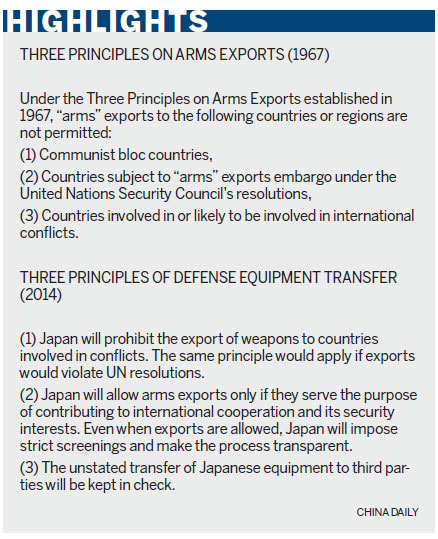PM would alter Constitution to 'restore former status' of nation
|
A Japan Maritime Self-Defense Force US-2 rescue flying boat approaches land during a fleet review off Sagami Bay, south of Tokyo, in October 2012. Nobushibe Takamizawa, deputy chief of Japan's recently created National Security Council, said the nation will primarily export technology and equipment for rescue, transport, surveillance and mine sweeping and is not considering assault equipment such as tanks and fighter jets. Provided to China Daily |
Abe has vowed to push for a wholesale revision of the Japanese Constitution to be enacted before the Tokyo 2020 Summer Olympics. "By 2020, I think Japan will have completely restored its status" and will be contributing to peace and stability in the region and world, he said.
Expanding Tokyo's ability to export arms will see the focus turn to Article 9 of the Constitution, but the article that is key to Abe's ambitions is 96.
Article 96 sets out the procedures required to change the Constitution, one that has never been altered - revised, reinterpreted, but never actually altered - since its enactment in 1947.
It states that any amendment must be backed by two-thirds of both houses of the parliament and a referendum. Abe wants just a simple majority in both houses, which he has, to allow him to change the constitution.

Reinterpretation has been successful at least in terms of defense. Japanese military spending will hit $232 billion over the next five years as it purchases anti-missile destroyers, submarines, 52 amphibious vehicles, surveillance drones, US fighter planes and 17 Boeing Osprey aircraft, which are capable of vertical takeoff. Not bad under a Constitution that forbids a standing army.
But if Abe can change Article 96, then the Liberal Democratic Party, which has been in power for all but a handful of the last 60 years, will be able to drive through wholesale changes to the Constitution, which has been reinterpreted on three key occasions.
The first time was in 1965, when the US was allowed to fly B-52s out of Japan's Kadena Air Base to bomb North Vietnam.
In 1991, Japan provided $13 billion in financial support to help remove the Iraqi army from Kuwait but no troops. Conservatives in Japan felt that this was a golden opportunity to press for a major constitutional change.
In 1999, Tokyo said it could provide logistic support to the US in emergencies in "areas surrounding Japan," which was understood to include the Korean Peninsula.
The Japanese government also passed a law in 2001 allowing it to refuel US vessels in the Indian Ocean in support of Operation Enduring Freedom - the war in Afghanistan.
But Abe's plans to further fiddle with the Constitution are facing opposition from within his own ranks. Retired lawmaker and former LDP secretary-general Makoto Koga said at a public lecture recently: "Changing a constitutional interpretation through a Cabinet decision is a patchwork measure. ... One mistake, and we could be involved in a war."
Emperor Akihito and Crown Prince Naruhito have indicated that they were against changing the Constitution.
The Japan Times stated in an editorial last year: "It cannot be emphasized too much that the LDP is trying to impose a constitution that runs counter to the principle of modern constitutional politics as well as postwar Japan's no-war principle."
In September 2007, Abe wrote in a magazine article that "From now on, I want to sacrifice myself as one lawmaker to make true conservatism take root in Japan".
Abe, from a wealthy political family, was exposed early on to the ultraconservative viewpoint on the knee of his grandfather, Nobusuke Kishi, a former prime minister.
Kishi was imprisoned for his wartime role, including atrocities committed in China, but never tried as a war criminal after World War II. He was prime minister from 1957 to 1960, but in an ironic twist, had to resign without achieving his goal of revising the constitution. You could say it runs in the family.
Abe has also pushed through a draconian secrets law that allows the government to decide what can be classified as secret. Critics say it is a charter against uncovering abuse of power.
Alarm bells are ringing. How they are heeded will determine whether the 2020 Olympics will see Japan delving into the past or embracing the future.
Tom Clifford is a senior editor at China Daily.
cliffordtomsan@hotmail.com
